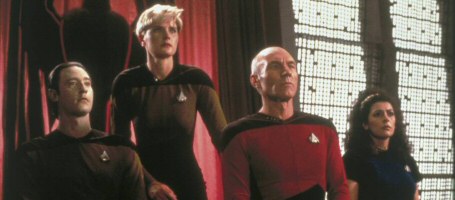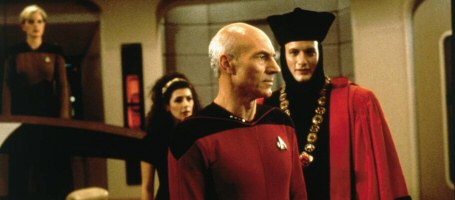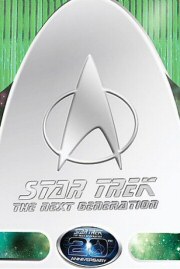 With the temperature dropping, it's time to find someone to keep you warm. Find your hookups with our online dating guide!
With the temperature dropping, it's time to find someone to keep you warm. Find your hookups with our online dating guide!
The Next Generation:
The Complete Series
- Sci-Fi
- 2007
- Buy the DVD
All photos © Paramount
Reviewed by Will Harris
()
ere’s today's entry in the category of Things To Make You Feel Really Old: “Star Trek: The Next Generation” is celebrating its 20th anniversary this year.
I can still remember the excitement I felt when I first heard that Gene Roddenberry had deigned to create an all new “Star Trek” universe for television, this time venturing 80 years beyond the era of Messrs. Kirk, Spock, McCoy, et al. Even without the internet, the buzz on the show was unprecedented. Everyone wanted to see what The Great Bird of the Galaxy would come up with; more importantly, people wanted to see how this new series would compare to the original show.
The idea of watching all 40+ discs of Paramount’s new 20th anniversary release of “Star Trek: The Next Generation – The Complete Series” is a daunting task. And by “daunting,” I mean that there’s just no way in Hell that I could’ve come anywhere near doing it to get this review up in a timely fashion. In a moment of incredible foresight, however, it just so happens that I put aside what could’ve been seven very successful years of Saturday night dates in order to watch every episode of the show when they were originally aired, just in case I might someday be asked to write a review like this one. No, don’t thank me, it’s all in a day’s work for a professional journalist. For purposes of refreshing my memory, however, I have gone through and watched the first disc from each of the seven seasons of “ST: TNG,” and it’s been decidedly educating to watch the show evolve.

The two-hour series premiere, “Encounter at Farpoint,” does a pretty good job of introducing all of the characters. We meet Capt. Jean-Luc Picard (Patrick Stewart) immediately after he’s taken command of the U.S.S. Enterprise, then watch as he suffers through his first encounter with Q (John de Lancie), the near-omnipotent being who would prove to be a thorn in his side throughout the run of the series. Simultaneous to that, we’re also checking in with the ship’s new first officer, Cmdr. William Riker (Jonathan Frakes), who’s waiting for pick-up at Farpoint Station, where he’s finding things a bit…off. As it turns out, there’s an alien being that’s essentially being held hostage and forced to shape-shift itself into looking like a perfect way-station for passing starships, but if we get into that, we’ll be here all day. Suffice it to say that, by the time these two storylines meet, so have we met all of the major players of the series: visor-wearing helmsman Geordi LaForge (Levar Burton); ship’s doctor Beverly Crusher (Gates McFadden); her precocious son, Wesley (Wil Wheaton); the half-Betazoid ship’s counselor Deanna Troi (Marina Sirtis); Klingon tactical officer Worf (Michael Dorn); security officer Tasha Yar (Denise Crosby); and the ship’s resident android, Lt. Cmdr. Data (Brent Spiner).
Some argue that the entire first season was pretty wobbly, and, well, they’re right. In fact, so much changes by the beginning of the second season that you can see why a lot of people opt to write off Season One entirely. Tasha Yar is killed off, replaced as security officer by Worf, who holds on to the position for the duration of the series. Similarly, Geordi LaForge finds himself promoted to chief engineer, where he stays for the long haul. Additionally, Wesley Crusher has earned enough credibility in the eyes of the crew to score the title of Acting Ensign, but the one notable change that doesn’t stick around – thankfully – is the replacing of Wesley’s mom with a new doctor: Katherine Pulaski (Diane Muldaur), who spends more time criticizing Data for not being human than anything else. (Thankfully for both Wesley and the viewers, Beverly Crusher was back on board by Season Three.)
After a relatively slow start, “The Next Generation” finally began to hit its stride in its third season, when the show finally offered up a full-fledged guest-starring appearance from the original series (Mark Lenard reprised his role as Spock’s father, Sarek), then closed the season with a cliffhanger involving the mechanized race known as the Borg, leaving viewers in suspense over the summer in a way that hadn’t been seen since “Dallas” asked, “Who shot J.R.?” From there, the show was a creative powerhouse, maintaining its stride until, well, some would say ‘til the end, but, realistically, the last season tends to have more downs than ups. The last episode, though, proved to be one of TV’s best and most complex grand finales, bringing the show full circle in a decidedly literal way.

“Star Trek: The Next Generation” might not be as fun as the original series, nor is it as consistent as “Deep Space Nine,” the “Trek” series that followed it, but it successfully reinvigorated a television franchise that most would’ve thought dead in the water after Kirk, Spock and McCoy graduated to feature films, an action that secured its place in sci-fi history in and of itself. Beyond that business achievement, however, the adventures of Jean-Luc Picard, William T. Riker, Data, and their compatriots on the U.S.S. Enterprise were, even in their cheesiest and most ridiculous adventures (we’re thinking in particular of the holodeck episode which took place on a train), highly entertaining to watch.
Special Features: This isn’t the first time that all the seasons of “ST:TNG” have been brought together into one set, so there are inevitably going to be a lot of fans who’ll be annoyed to hear that this version does, in fact, have a few featurettes which aren’t available on the previous release. Given that this is an anniversary reissue, there’s a new special -- hosted by John DeLancie – that looks back at the path to the series’ creation, as well as how it’s viewed two decades on. There’s also an extremely well-produced featurette hosted by Wil Wheaton that takes a look at various sci-fi events and scientific advancements around the world. Otherwise, the majority of the features are the exact same as have appeared on the previous releases of the seasons. They’re nicely done (and can be found on the Amazon pages for their respective entries), but the one thing that’s sorely missing from this set (and all of its predecessors) is audio commentary, which would add immeasurably to the viewer’s perspective of how the show came together.
You can follow us on Twitter and Facebook for content updates. Also, sign up for our email list for weekly updates and check us out on Google+ as well.











